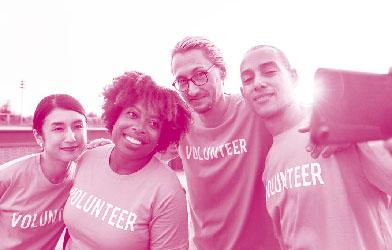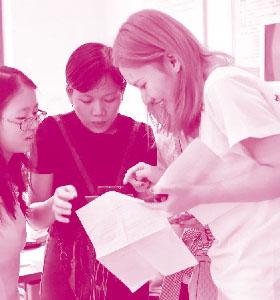Five Scientific Methods for Improving Mental Health 改善心理健康的 5 种科学方法



1. Practice optimism
以乐观的心态实践
The studies are positive: Looking on the bright side of life is really good for you. Optimists who have a 35% less chance of having a heart attack or stroke, are more likely to eat a healthy diet and exercise regularly, have stronger immune systems; and even live longer. In fact, a study in 2019 found people with the most positive outlook had the greatest odds of living to 85 or beyond.
研究給出了正面的证明:关注生活光明的一面确实对人有好处。乐观主义者心脏病发作或者中风的概率要比其他人低35%,同时他们更有可能摄入健康膳食,定期锻炼,拥有更强大的免疫功能甚至拥有更长的寿命。事实上,2019年的一项研究发现,心态最乐观的人寿命也是最长的,他们能够至少活到85岁。
Not a natural optimist? No worries. Science has shown you can train your brain to be more positive. Only about 25% of optimism is programmed by our genes anyway.
不是天生的乐观主义者?别担心。科学表明,人们可以通过思维训练来变得更加积极乐观,毕竟只有25%的乐观因素根植于基因之中。
2. Start volunteering
开始志愿之旅
A prayer attributed to St. Francis of Assisi tells us, “It is in giving that we receive.”
阿西尼城的圣弗朗西斯的祈祷告诉我们:“我们所得到就是我们所给予的。”
It turns out he was scientifically right. Studies have shown that putting the well-being of others before our own without expecting anything in return, or what is called being altruistic, stimulates the reward centers of the brain. Those feel-good chemicals flood our system, producing a sort of “helpers high”.
研究证明这是科学的论断,将他人的福祉放在自我福祉之前,不求回报地为他人付出也就是所谓的利他主义会刺激我们大脑的奖赏中枢。这些让人感觉愉悦的化学物质会充盈人体系统,让助人者获得快乐与满足。
3. Be grateful
感恩
We have heard a lot about the benefits of thankfulness in the last decade, and that is backed by science: Counting our blessings protects us against anxiety and depression and boosts optimism. Need more proof? Middle-schoolers who practiced gratitude exercises had less problem behavior.
在过去的十年中,我们经常听到关于感恩的各种益处,并得到了科学的支持:数算福分可以保护我们免受焦虑和沮丧的困扰并激发乐观情绪。需要更多证据吗?那些接受过感恩教育的中学生出现的问题行为更少。
One of the best ways to make thankfulness a part of your life, say experts, is to keep a daily journal. Before you go to bed, jot down any positive experience you had that day, no matter how small it is.
如专家们所说,使感恩成为你人生的一部分的最佳方式之一是记日记。在你睡觉前,简单记下你在这一天遇到的各种正能量的经历,不论大小。
If you do that for one minute each morning and evening, that sense of appreciation can broaden to everyone in your life and bolster optimism and better mental health.
如果你每天早晚用一分钟的时间来做这件事,这种感恩之情将扩散到你生活中的每个人身上,增强你的乐观情绪,改善你的心理健康。
4. Bolster your social connections
维持你的社交网络
“People who are more socially connected to family, to friends, to community, are happier, theyre physically healthier, and they live longer than people who are less well connected”, said Harvard psychiatrist Robert Waldinger.
哈佛大学的精神病学家罗伯特·瓦尔丁格说:“那些与家庭、朋友和社区联系更加紧密的人会更加开心、更加健康,寿命也更长。”
The proof for it comes from the Harvard Study of Adult Development, which tracked 724 Boston men for more than 75 years and then began following more than 2,000 of their offspring and wives.
哈佛的成人发展研究为此提供了证明,这一研究追踪了724名波士顿人超过75年,然后还追踪了2000多名他们的后代和妻子。
“The clearest message that we get from this 75-year study is this: Good relationships keep us happier and healthier.” Waldinger said.
瓦尔丁格说:“我们从这一长达75年的研究中所获取的最明确的信息是:良好的社会关系能够使人们更加快乐和健康。”
5. Find your goal
找到你的目标
Finding a sense of purpose contributes greatly to well-being and a longer, happier life, experts said.
專家们曾称,拥有目标感对于幸福和更长久、快乐的生活具有极为重要的意义。
University of Pennsylvania psychologist Martin Seligman, who co-founded the field of positive psychology, says a sense of purpose will come from being part of something bigger than ourselves. He points religion, family, and social causes as ways to increase meaning in our lives.
宾夕法尼亚大学的心理学家马丁·塞利格曼是积极心理学领域的共同创始人,他说目标感来源于成为比我们自己更加庞大的事物的一部分。他指出宗教、家庭和社会事业能够使我们的生活更具意义。
Word Study
odds /?dz/ n. [pl.]概率;几率;可能性
What are the odds of finding a parking space right outside the door?
attribute /?'tr?bju?t/ v. 把……归因于;认为……是
stimulate /'st?mjule?t/ v.促进;激发;刺激
boost /bu?st/ v.使增长;使兴旺

